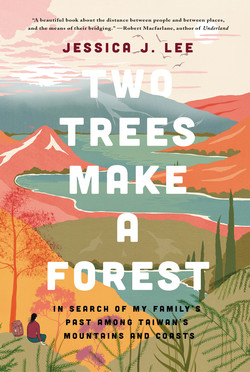Читать книгу Two Trees Make a Forest - Jessica J. Lee - Страница 19
На сайте Литреса книга снята с продажи.
ОглавлениеTHE EARTH WAS PATTERNED RED AND BROWN. She had watched it from the porthole of the plane, waiting in silence as a geometric patchwork became fields cut for harvest and the arboreal carpet sharpened to individual trees. Sugar maples, red oaks, and pines. Suburbs scattered out in all directions, and through them cut a snaking vein of concrete, dotted with cars. Flat, everywhere was flat. The ground rushed up to meet the landing gear, and then all she saw was gray, cloaking the bare ground and low buildings, sending a dusty smell through the air.
This is how I imagine it. On October 13, 1974, Thanksgiving Sunday, my mother arrived in Canada. My grandfather, who had moved a few months earlier, was waiting to pick her up.
She told me about the drive from the airport, her disbelief at the vastness of it all. Immigration was not something she had planned: she had just turned twenty, had been enrolled in secretarial college in Taipei, hadn’t wanted to leave. She had friends there, a young life. Taipei at that time had 2 million residents; Niagara Falls, just under seventy thousand.
But Gong had seen places like the Canadian suburbs many times before and was more comfortable in this new terrain: He had trained as a pilot in Arizona and Colorado and spent time in New York and California for work. He had grown familiar with North American sprawl, with a vast uniformity unseen in the sheltered depth of the Taipei Basin. But I cannot erase my imagined memory of their shared longing for the warmth of Taiwan and its hills and the vision of a new land creeping up beneath them, the country ceaseless and cold.
My grandfather had been born into winter, in the rural lands beyond Beijing. Today’s maps show me perfect, rectangular fields, a square of clustered buildings forming a dense village. The open homestead he wrote of in his letter is nowhere to be found. But I have formed its walls from his words and my mother’s stories, inhabited the scene with this unknown family. Nearby sit our ancestors’ tombs—unkempt, I imagine, for who is there to sweep the graves come springtime?
It was 1919, the Year of the Earth Sheep. The Great War had not long ago finished, and the world was in the midst of negotiating what would become the Treaty of Versailles. In a small courtyard house in Hebei Province, my grandfather, Chung-chin, was the first boy in a family of sisters. He was nicknamed San-ni (Third Gentle Girl), as if a girl’s name might make life easier.
The world outside grew turbulent. The aftershocks of Versailles rattled out in dispersion: The May Fourth protests had spawned a movement; student activists were proclaiming a new culture, seeking an end to the Confucianism that had shaped China for centuries. Nationalists, communists, and warlords allied and disavowed one another, purges and betrayals forming a brutal beat. The time was a blur to a young boy, coming into focus only when it touched Gong’s small life: fleeing the conflicts and staying in far-off Beijing hutong houses in lanes with names like Bamboo Oblique Street, Pine Alley, Little Four Eyes Well. The March 18 Massacre in 1926—in which the military fired into a crowd of protestors, killing forty-seven—was a violent interlude he witnessed uncomprehendingly. Warlords and generals passed through town; their names he would recognize only in later life.
At home, Gong found some regularity and comfort. He slept each night in his grandmother’s room and listened to stories each afternoon as he lay on his grandfather’s tummy. From the age of five onward, he spent some of each day in the kitchen, learning to cook as he played sous chef to his mother. I imagine, now, that she taught him all the things that I remember, memories from my great-grandmother passed on as meals. Together they made fluffy mantou, packed into bamboo steamers in their small kitchen. They folded pork jiaozi and seared spiced Xinjiang lamb. In those early years, his mother taught him to cook an entire Chinese banquet, with formal dishes from every region. She died of heart failure in 1929, when my grandfather was ten.
“After that,” he wrote in his letter, “it was as if the whole family scattered. In my memory, it was as if I was the only one who stayed in our old house in our old village.”
I imagine him then, a quiet boy whose ties to home vanished the way steam runs into air.
Half the world away, in a different country, I watched Gong fold dumplings the way he had learned at his mother’s hip seven decades earlier. He was nimble-fingered and gentle, and each dumpling was perfect on the plate. He shaped and laid out each folded bundle with care, offering them, perhaps, for inspection to a friendly, familiar ghost.
